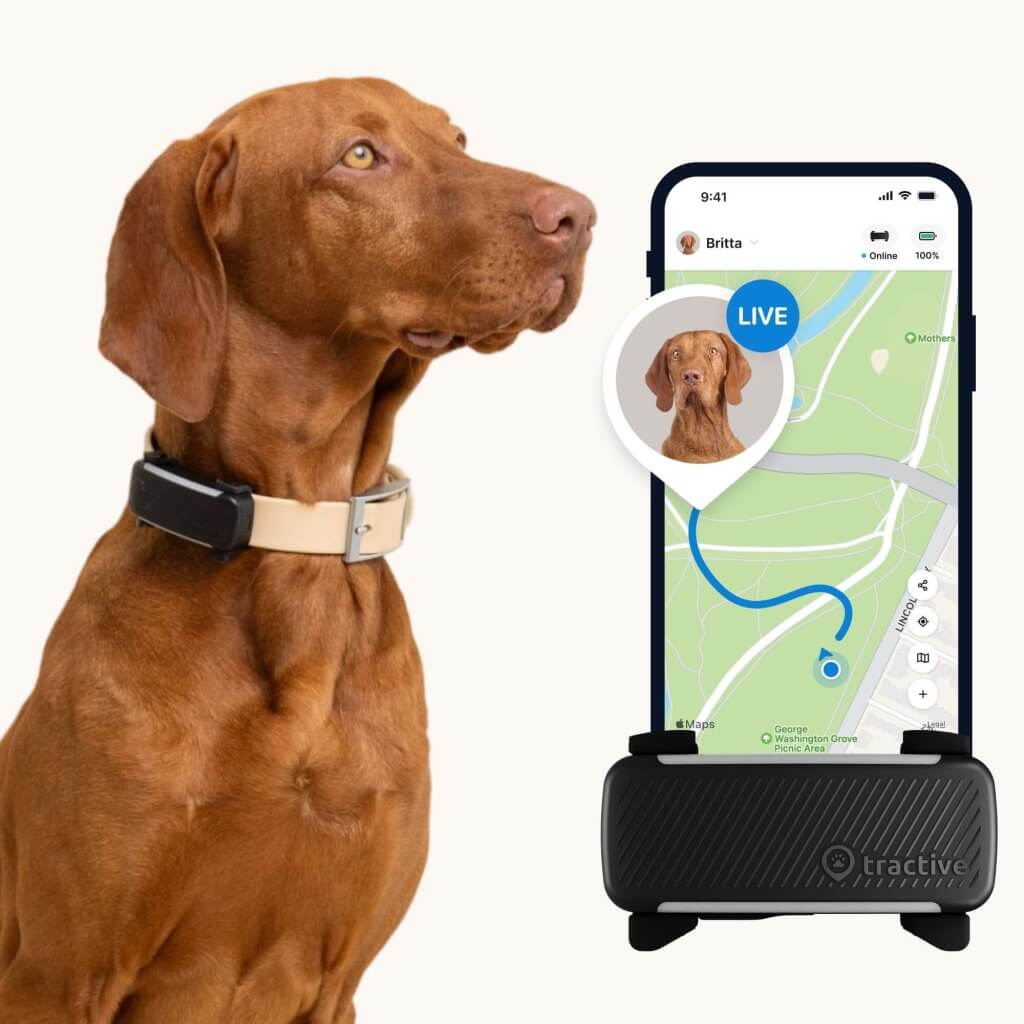 Approved by Dr. Dwight Alleyne, DVM
Approved by Dr. Dwight Alleyne, DVM Dog Barking at Night: 6 Reasons Why & How To Stop It
Your dog's super senses could trigger some nighttime barking - or it could be due to boredom, anxiety, or even health issues. Here's how to figure out what's causing it - and how to stop it for good.

We’ve all been there: just as you’re about to drift off to sleep, your dog starts barking. Whether it’s a sudden outburst or a nightly ritual, a dog barking at night is a recipe for lost sleep. So, why does it happen? And more importantly, how can you address it? Let’s dive into the reasons behind night-time barking and where a smart dog tracker with Bark Monitoring can help.
Key Takeaways
Figure out what’s causing your dog’s barking
Barking at night can stem from anxiety, health issues, boredom, or environmental factors.
Take action
Consult your vet, create a calming sleep environment, and ensure your dog gets plenty of daytime exercise. A calming bedtime routine can include one last nighttime walk and a bit of playtime before bed.
Get in touch with the pros
Professional trainers and behaviorists can help you keeping your dog’s needs in mind if you’re dealing with persistent barking.
Use a dog bark monitor to better understand your buddy’s behavior
The Tractive GPS can help you monitor your dog’s barking, sleep patterns, and activity levels to figure out the root cause of your dog’s barking.

Always know your buddy is healthy & safe
Read moreWhy is my dog barking at night?
Dogs bark at night for a variety of reasons. They could be trying to:
- Show something outside who’s boss
Your dog might bark at unfamiliar sounds, animals outside, or even distant traffic noises. If you’ve ever wondered, why is my dog barking at nothing at night? – it could just be their senses picking up on a raccoon shuffling through the undergrowth outdoors. - Get along with the neighborhood dogs
Your dog’s sharp ears are likely to pick up on other dogs barking a distance away – leading to a nightly chorus. - Tell you they feel scared or anxious
Your dog might feel anxious about being left alone, especially if it’s a new environment for them. (Like if you’ve shifted apartments.) Or, for example, if they sense an approaching storm. - Signal they’re feeling unwell
Barking can be a sign of physical discomfort or health issues. Senior dogs, in particular, may develop cognitive dysfunction (similar to dementia in humans) or experience pain that makes them restless and vocal at night. - Get used to the crate
Got a dog barking in the crate at night? It could be that they’re uncomfortable, need to go to the bathroom, or feel confined. Place their crate near you so they feel calmer and only gradually increase the distance until they can safely sleep in another room without barking for attention. - Keep themselves occupied
Dogs with pent-up energy may bark simply because they’re bored or under-stimulated. Younger dogs or high-energy breeds often need extra physical and mental exercise during the day to settle down at night.
💡A smart dog tracker with Bark Monitoring can help you figure out whether there’s a weird spike or drop in your dog’s barking. So you can figure out what’s triggering it and take steps to help your buddy calm down.

Follow your dog anywhere
Get real-time location information, wherever they go. And find out when they try to make an escape, or just when they go somewhere they shouldn’t, with Virtual Fences.
Why is my old dog barking at night all of a sudden?
As dogs age, their behaviors often change. If your older dog has started barking at night, it could be due to:
- Cognitive Dysfunction Syndrome (CDS)
Aging can impact a dog’s brain, leading to confusion, anxiety, and disrupted sleep patterns. - Hearing or vision loss
These changes can make them more reactive to unfamiliar sounds or shadows. - Chronic pain
Arthritis or other age-related conditions might make it hard for your dog to get comfortable.
If your senior dog’s barking is sudden or persistent, get in touch with your vet to rule out underlying medical conditions.
Should I ignore my dog barking at night?
Sadly, the answer to this is a big “It depends.” Rather than ignoring or responding to every bark, it’s important to figure out what’s causing your dog’s barking in the first place. If your buddy seems healthy and not otherwise in distress, it could be due to boredom or loneliness. But if it’s because of anxiety, discomfort, or health issues – ignoring the barking could worsen the problem.
So first things first, keep an eye out for the signs of illness in dogs. (Especially if you’ve got a senior dog at home.) Next, consider if you’ve just made a big change in your dog’s routine (like bringing them to a new home) that might be triggering any anxiety. The following steps can help, depending on what’s causing the barking.
How to stop a dog barking at night
- Speak to your vet
Health issues, especially in senior dogs, can cause nighttime barking. Your vet can help identify and treat pain, anxiety, or other medical concerns. (Like if your dog’s breed has anxious tendencies.) - Create a comfortable sleeping environment
Ensure your dog’s sleeping area is cozy, quiet, and free of drafts. Use white noise or calming music to mask outside noises. Make sure the dog crate is the right size and includes comfortable bedding. - Try a calming bedtime routine
Including a short walk (and toilet break) and one last playtime session. For anxious dogs, consider calming aids like pheromone sprays or anxiety wraps. - Don’t skip out on the workout
A tired dog is a happy dog. Make sure your pup gets plenty of walks, playtime, and regular training. (Especially for commands like “Quiet.”) If you can’t make time, a dog walker can get them some activity throughout the day. - Reward your dog plenty when they ARE quiet
If your dog complies after you give them the “Quiet” command, make sure to praise and pat them plenty. Likewise, if they’re quiet at other times of the day without you prompting them. - Put your dog in “time out”
When your dog starts barking, put them in a safe, quiet environment for a few minutes – like the bathroom – where they can’t hear much from outside. Once they’ve stopped, let them outside. But put them briefly inside again in case they begin again. - Distract your dog from “scary” sounds
Keep some toys or treats around to draw their attention away from whatever’s triggering the barking. With time, this can slowly help them learn to treat these sounds as normal and non-threatening.
If your dog’s barking persists, get in touch with a professional trainer or behaviorist. Both you and your dog will be in the right hands, especially when it comes to weaning them off this behavior.
Where a dog bark monitor can step in
When it comes to tackling barking at night, a smart dog tracker with Bark Monitoring can help you better understand your dog’s behavior – and figure out the root cause. For example, your Tractive device comes with:
- Activity tracking
Your tracker alerts you to signs of anxiety like restless pacing, unusual increases in activity, or spikes in barking that might indicate anxiety, discomfort, or environmental triggers. You can also compare how active your dog is to other, similar dogs around the world – including of their breed. So you can figure out if yours has gotten enough exercise for the day. - Real-time bark alerts
You’ll get notified whenever your dog barks more or less than usual, helping you detect patterns or sudden changes in behavior.

- Sleep insights
Your Tractive device comes with a built-in motion detector to help you better understand your dog’s sleep patterns as well. This can help you figure out any disruptions that might be causing nighttime barking.
- Separation Anxiety monitoring
Switch on the Separation Anxiety monitor via your Tractive app – and get an alert if your dog’s barking spikes, followed with other signs of anxiety, like restless pacing or hyperactivity. So you can intervene early and keep your dog’s crate a little closer by during nighttime.
All these can help you both understand what’s going on with your dog, plus share valuable data with your vet or trainer. With your dog’s barking data at hand, you can make an informed decision what steps to take to help them feel better.
Because at the end of the day, your trusty Tractive device isn’t just about location – it’s about understanding and improving your dog’s overall well-being.
Your furry friend’s health and wellbeing means as much as to us as it does to you. So we’ve made it a priority to only share medically-relevant content on our blog. This post was checked, double-checked, and medically verified by Georgia-based vet, Dr. Dwight Alleyne.

Dr. Dwight Alleyne, DVM
Originally from Long Island, New York, Dr. Alleyne began his career at a no-kill animal shelter before becoming a licensed veterinary technician. He graduated from Cornell University Veterinary College in 2006 and completed an internship at Purdue University. Now practicing in Georgia, Dr. Alleyne specializes in soft tissue surgery and ultrasounds. He also writes pet health articles on his website, “The Animal Doctor Blog” (www.anmldrblog.com).



